In Kathmandu I experience the world primarily through the open windows of taxi cabs. Outside, in the smog, in the heat, chaos thrives: Hindi temples, Buddhist stupas, and a criss-cross of prayer flags; dust and garbage and broken-down buildings; a frenzied dance of mopeds, cars, cows, and people.
This is my kind of city.
I want nothing more than to open the car door, to release myself into this madness, to get lost on the uneven streets. I want to get closer. I want to roam. Leaning my head out my window, my senses awaken. All around are things I want to touch, taste, or smell. I want to inspect the buffalo meat hanging outside the butcher. I want to sort through the colorful fabrics tucked away in tiny shops and sample mystery flavors in side street restaurants.
From the security of her passenger seat, La flâneuse becomes a caged animal.
These past few weeks, disappointment has been a constant threat. I’ve been held captive by a feeling of powerlessness, a sense that none of this is a part of my plan. I feel out of touch with my body, a body whose strength I have trusted to carry me on foot for hundreds of miles.
On my last full day in Bhutan, I have to stay behind in my hotel room while my friend Michael and our guide Sangay hike to the Tiger’s Nest. This sacred site, perched high on a cliffside in the Paro valley, is perhaps the most iconic image of Bhutan, and it is something that was supposed to be the climax of our trip to this magical, landlocked country. But the trek is a steep climb, an all-day hike, and with my CAM boot, crutches, and still-fragile fracture, I know that I can’t possibly make it there. Not even close. Though I am happy for my friends, at the same time it is hard to fight my frustration.
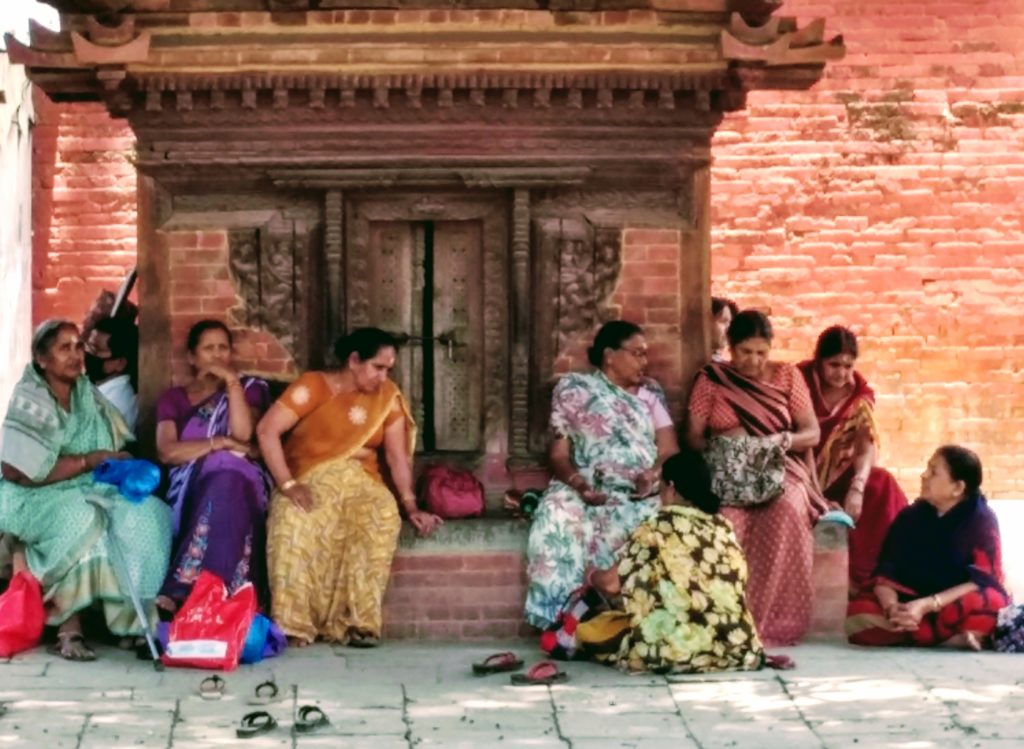
It’s easy at times like this to obsess over the can’ts. The list of what I can’t do feels endless: I can’t hike in the mountains; I can’t dash up the many (many) steps leading to shops and restaurants; I can’t stroll down jagged alleyways; I can’t walk through the rice paddies; I can’t carry a cup of tea; I can’t stand up in the shower. Even the most simple task becomes impossible, and I find myself realizing that all my life I’ve taken my physical strength for granted.
In Bhutan, Sangay, my guide, my teacher, my friend, tells me that I need to focus on the positive. I need to stop thinking. I need to be happy. At a monastery high in the mountains he introduces me to two boys, twins, who were abandoned by the side of the road as babies and are now living at the monastery.
“These boys will never know their mother,” he says to me, his attentive eyes catching mine.
Sangay is not scolding me, but through his words, as I see the boys’ smiling faces, as I watch them sit down with their friends to a simple lunch of red rice topped with cheese and chile, I am reminded to see the beauty and the joy in my life, to see the beauty and joy that surround me, to see the beauty and joy in every moment, in every experience.
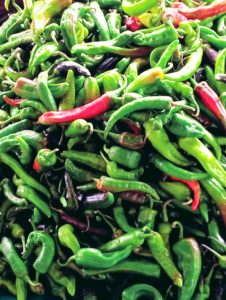
To find the positive.
As I move through my new world, I find that children, especially, are intrigued by me. Their wandering eyes follow me when I pass by on my crutches or in my wheelchair. At a farmer’s market in Thimpu, I see two girls dressed as Disney princesses, and when I call out, “Beauty and the Beast,” they giggle and chase after me.
Later that morning, a little girl, probably three years old, is clearly worried by my foot. She silently follows me from one stall to the next. I try and tell her what happened through hand gestures, but she leans in closer, resting her body on my wheelchair. She remains concerned and is only reassured that I am okay when Sangay carefully explains my story.
A few days later, on my way back to the van after a quick lunch in Paro, a young boy spots me. His eyes widen. I smile and wave at him. He waves back and then runs inside calling for his mother. He returns to the street, still waving at me.
“Hello!” he calls out. “Hello!”
“Hello!” I call back to him as the van pulls away.
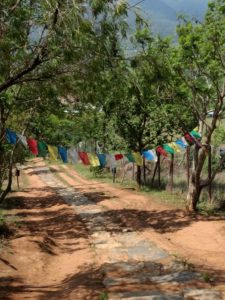
When I walk on crutches, I have to stop and rest often, sometimes every five steps. My movements awaken muscles I never knew existed. Sweat drips from every pore. My arms ache. My shoulders ache. Everything aches. But I quickly realize my exhaustion isn’t a burden. On the contrary, it is an opportunity.
Every time I stop, strangers approach me. I am a source of fascination, a mystery. Tourists stop me. Locals stop me. Vendors stop me, not to try and sell me something, but out of sheer curiosity. Everyone wants to know where I’m from, how I hurt myself, where I hurt myself, how long I’ll be traveling.
In Kathmandu, as I walk a slow clockwise circle around Boudhanath Stupa, I see monks and nuns bow in prayer for me. In front of a row of prayer wheels, a woman from London stops to tell me how brave I am. Later in the week, as I crutch my way down the middle of a dirt road battered by construction, I meet a man sitting in front of a small souvenir shop. He offers me a seat in the shade. Every time I pass by the shop he is sitting there, and I pause to talk with him.
Still later, at Swayambhunath, a man selling singing bowls helps me when I stumble on the first of many steps up to the temple. He uses one of his bowls to send vibrations through my body in a healing ritual. On the way back down from the temple, he stops me again; I remove my CAM boot and he continues sending vibrations through my leg and foot. I intuitively trust him, trust his gentle touch. After an hour has passed, when he hugs me goodbye, he calls me sister. My eyes fill with tears.
“If I hadn’t broken my foot, this wouldn’t have happened,” I tell Michael on the way to the parking lot. “I feel so lucky.” The words feel strange when they form on my tongue, but I know that they are my truth.
I admit that it can be a challenge to live this lesson, to fully accept that I cannot do the one thing I want to be doing, the thing that has given my life so much purpose this past year. It is a challenge to remind myself that I can only do what I am capable of doing in this moment and to appreciate the now.
But I know that it is a waste of time to exist in what could be happening rather than in what actually is happening. In time I realize that it is a privilege to be able to travel as I have been, to receive so much from so many people, people who have so little monetarily but who still have so much to give. This is a gift that can’t be bought in a store. It is the gift of compassion that I have received through this unique experience.
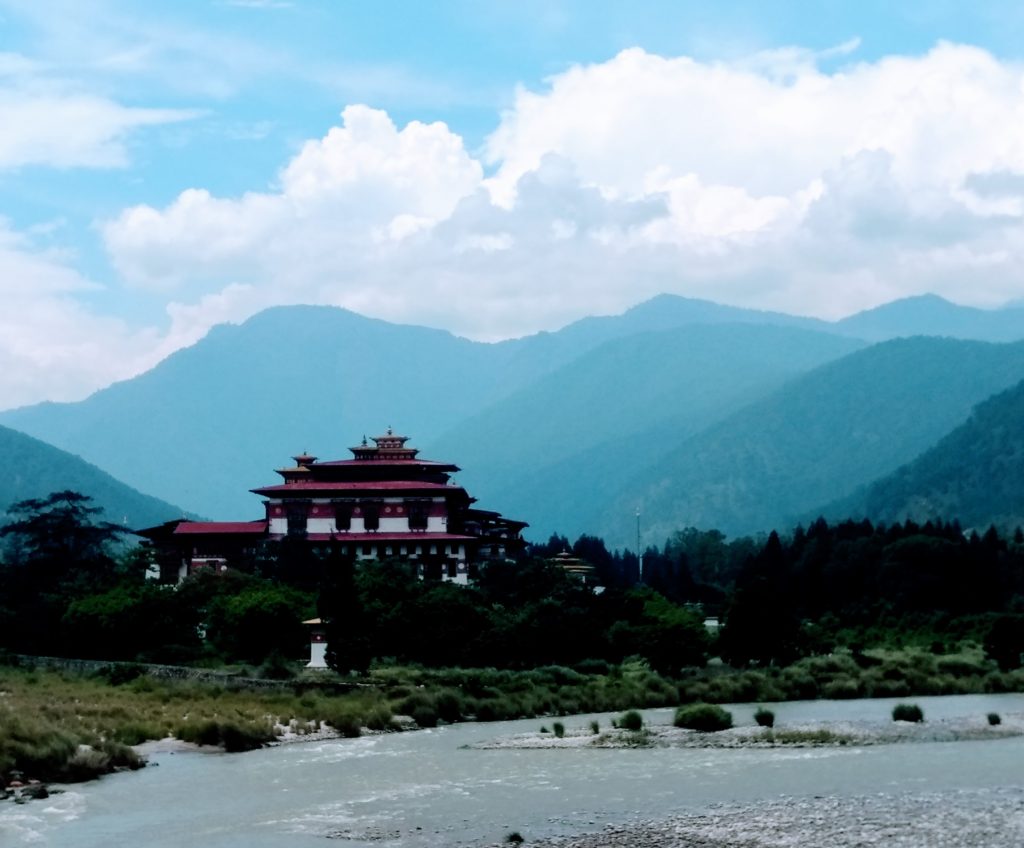
The day before Michael and Sangay hike to the Tiger’s Nest, we stop at a suspension bridge that crosses a river.
It is an uneven slope down to the bridge, and as I get out of the van Sangay tells me, “I think this walk may be too much for you.”
“I can’t go with you tomorrow. I am hiking down to that bridge,” I say, determined as I position my crutches on my forearms.
He smiles. “Good,” he says.
“Because I know that if I really couldn’t do it you would tell me, right?”
“Yes.”
It is slow moving down to the river, each step a cautious one as I maneuver my crutch tips around rocks and pits in the hard earth. But Michael and Sangay are with me at every step, helping steady me when I need it and kicking loose stones from the trail.
Once we cross the bridge, Sangay and I sit on rocks by the water while Michael continues climbing up to a small temple. On a steep decline alongside the road, we watch a cow grazing. We wonder how she got down there and how she’ll get back up to the road.
“She is like you,” Sangay tells me. “Stubborn.”
“That is a good compliment,” I say.
“Yes, it is a compliment.”
As the cow moves along a horizontal path into a grassy patch I say, “If I were a Bhutanese cow that would be me on that hillside.” I know she’ll make it back up to the road eventually, but even if she slips and falls, she’ll only land in the water. “At least then she’ll get a bath,” I say.
Sangay laughs.
“Just being positive,” I say.
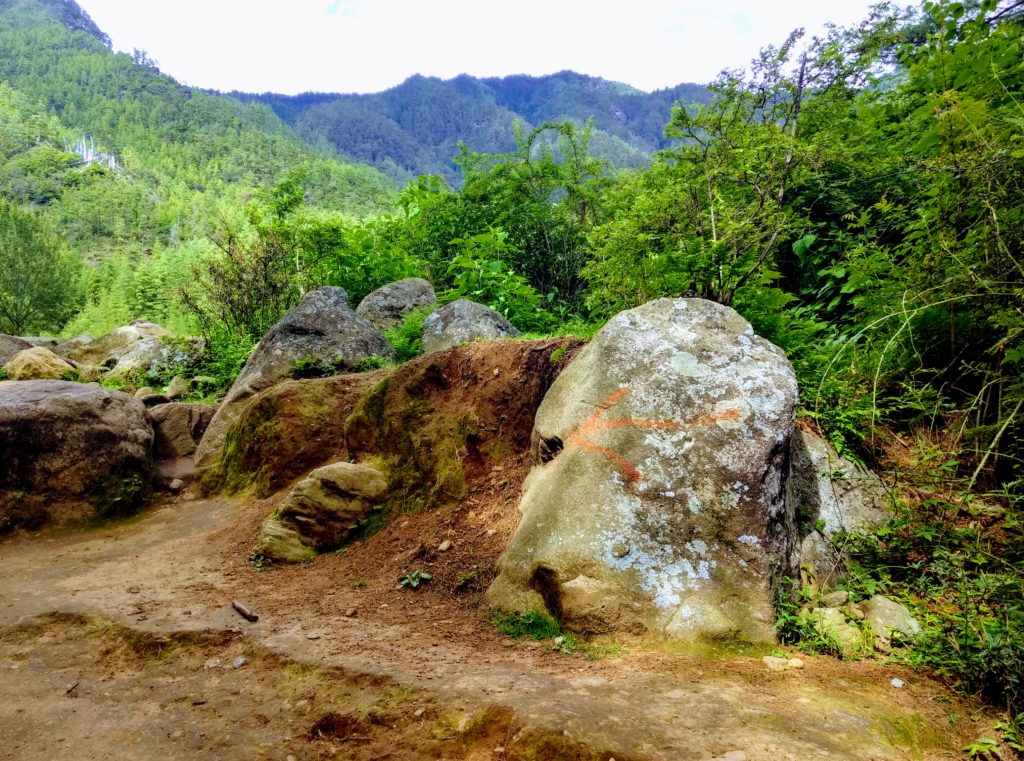
The next morning, Sangay tells me that he and Michael will carry me in their hearts when they hike to the Tiger’s Nest, and when I tell him that I will walk from base camp to meet them along the trail, his eyes light up. “That will make me happy,” he says.
In the afternoon, when our driver Karma and I visit Kyichu Lhakhang temple and eat Bhutanese food in Paro, I remember Sangay’s words. I am here at this temple, I am here eating chile and cheese with Karma, but I am still on the trail with them. And, as always, I carry my friends with me, too.
Later, Karma takes me to the base camp of the Tiger’s Nest. On foot, we pass between stalls selling souvenirs and make our way to the trail head. Like Michael and Sangay before, Karma helps me with every step I take. Being on the trail, being near the cool green of trees in the crisp mountain air, invigorates me with an energy I haven’t felt in weeks, though I still have to stop often to rest.
My stubborn eyes fall on a landmark a few feet ahead. “That rock,” I say aloud. “All I have to do is walk to that rock.”
One step at a time. Then rock, then rest.
“Those horses,” I say. “I’m going to walk to those horses.”
One step at a time. One step at a time. Karma and I pause to pet a long-legged mule.
But more often I am stopped by hikers returning from the top. Everyone wants to know, “Are you hiking the entire way?”
I laugh. “No, that’s much too far. I’m just walking to meet my friends,” I say again and again. “But it’s a great afternoon for a hike. I hope you had a beautiful day.”
High on the mountain cliffs I eye the Tiger’s Nest. I remind myself that it has been there for five hundred years and it will still be there when I go home. I remind myself that it will likely be there long after I die. Whether or not I ever make it to the temple is irrelevant. Keeping my eyes on an unreachable destination is meaningless. What matters is where I am right now. This tree. This rock. This bird. This flower. I find this fact reassuring.
And then, just when my body is telling me it is time to stop hiking, I spot a red arrow on a rock. It is a message that I am still on The Way, that in the end, this is simply my journey, my life, my story. In the end, The Way is always the goal, I remember. Of that, I am positive.
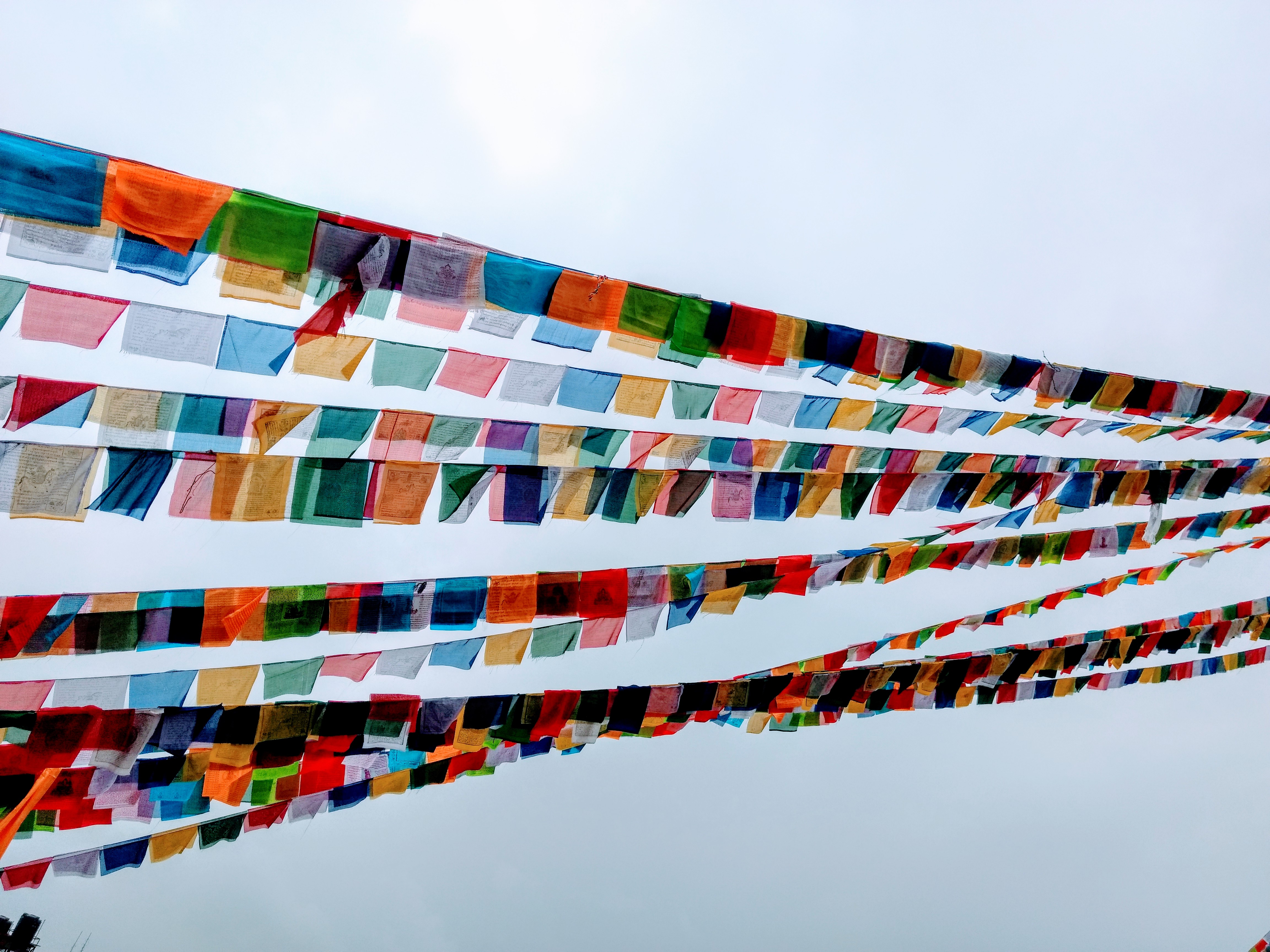



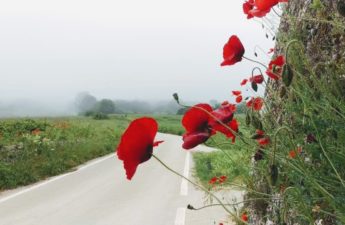
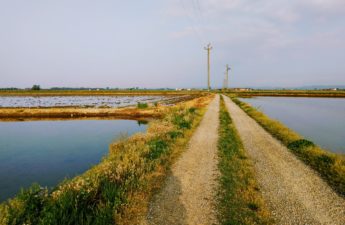
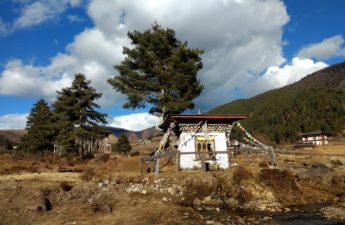
Wow! Just wow! What a frinking amazing and inspiring piece and what a fantabulous woman you are. To even get to Bhutan (at last) in your state is amazing but these musings are just beautiful, I’m so glad you are taking the positive message and I’m so proud to know you (and I may have cried a little bit)
You rock.
Thanks, friend! I love you! It’s truly been a life-altering few weeks.
(And I’m sure you realize that I cried a bit, too — xo)
You’ve made me cry again. I’m so proud of you! You should get this published to inspire others.I’m going to read in to the “happy hour gals”.
Did you know Bev’s granddaughter is Nepalese? Her son and daughter-in-law adopted her. I met them last evening; they’re visiting Bev. Lovely family. Angelie is a beautiful young woman, sixteen years old.
I’ve finished WANDERLUST. I enjoyed it; parts were a bit deep for me—I lack the background about some of the people she referenced.
On the whole I could identify . . .
Keep going, Daughtie! Love, Mumsie
Thanks, Mumsie! My love to the happy-hour girls. I knew that Bev had lived in Nepal, but I don’t remember hearing about her granddaughter. Glad you enjoyed “Wanderlust.” There are so many references that she makes, but I knew it’d be a book you could relate to.
Love you!
You are an inspiration! You are one tough person! Keep the faith, and thanks again for sharing your wonderful adventures. It makes my day to open Facebook and find another chapter! Happy Trails!
Thank you, Jim for the kind words! Happy to bring your day some happiness 🙂
Dear Theresa,
Not sure how we friended on FB—possibly through Cindy Hicks or Ceiny. In any case, it was a fortunate connection. I have appreciated having had the opportunity to follow your trip with its attendant challenges.
I too was looking forward to a Bhutan-Nepal adventure this fall, but a sudden back problem forced me to cancel. Thanks for providing wise perspective on what we may want to do but be unable to.
Have a safe journey home.
Linda
Hi Linda! Thanks for the comment! Yes, I know Cindy, and Ceiny was a dear friend and mentor. I’ve thought of her often during my travels.
I do believe that if you adjust your expectations, you can still have a wonderful trip. It might take some work and planning, but it’s possible. Just take it slowly and embrace what you can do 🙂
For it meant letting go of a few things I had originally wanted to do but then realizing the time I had was still my time, and that was just as fantastic.
You are so lucky! (And yes, it feels very strange to say that from this direction, too.) I love your perspective.
As strange as it may feel, lucky is so right, though! Welcome back to your other home; I hope to hear more of your adventures in Venice 🙂
xo